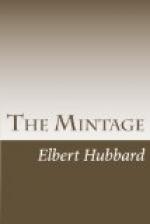-------------------------------------
I would write across the sky in letters of light this undisputed truth, proven by every annal of history, that the only way to help yourself is through loyalty to those who trust and employ you.
BATTLE OF THE LITTLE BIG HORN
It was in the Spring of Eighteen Hundred Seventy-six that the Sioux on the Dakota Reservation became restless, and after various fruitless efforts to restrain them, moved Westward in a body.
This periodic migration was a habit and a tradition of the tribe. For hundreds of years they had visited the buffalo country on an annual hunt.
Now the buffaloes were gone, save for a few scattered herds in the mountains. The Indians did not fully realize this, although they realized that as the Whites came in, the game went out. The Sioux were hunters and horsemen by nature. They traveled and moved about with great freedom. If restrained or interfered with they grew irritable and then hostile.
Now they were full of fight. The Whites had ruined the hunting-grounds; besides that, white soldiers had fought them if they moved to their old haunts, sacred for their use and bequeathed to them by their ancestors. In dead of Winter, when the snows lay deep and they were in their teepees, crouching around the scanty fire, soldiers had charged on horseback through the villages, shooting into the teepees, killing women and children.
At the head of these soldiers was a white chief, whom they called Yellow Hair. He was a smashing, dashing, fearless soldier who understood the Indian ways and haunts, and then used this knowledge for the undoing of the Red Men.
Yellow Hair wanted to keep them in one little place all the time, and desired that they should raise corn like cowardly Crows, when what they wanted was to be free and hunt!
They feared Yellow Hair—and hated him.
Custer was a man of intelligence—nervous, energetic, proud. His honesty and sincerity were beyond dispute. He was a natural Indian fighter. He could pull his belt one hole tighter and go three whole days without food. He could ride like the wind, or crawl in the grass, and knew how to strike, quickly and unexpectedly, as the first streak of dawn came into the East. Like Napoleon, he knew the value of time, and, in fact, he had somewhat of the dash and daring, not to mention the vanity, of the Corsican. His men believed in him and loved him, for he marched them to victory, and with odds of five to one had won again and again.
-------------------------------------
But Custer had the defect of his qualities; and to use the Lincoln phrase, sometimes took counsel of his ambition.
He had fought in the Civil War in places where no prisoners were taken, and where there was no commissary. And this wild, free life had bred in him a habit of unrest—a chafing at discipline and all rules of modern warfare.




